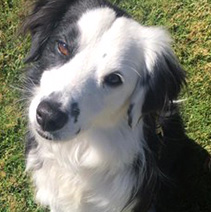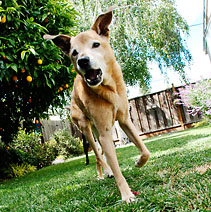One of the most common reasons for dog owners to seek professional help due to a behavior problem is separation anxiety. The symptons include but are not limited to destructive behavior (even if that means for your dog to get hurt or injured) during the owner’s absence, urination and defecation in the house, extreme attachment to the owner to the point of never wanting to leave his side, and an exuberant “thank God you’re home” greeting upon the owner’s return. Many affected dogs also refuse to eat while the owner is gone, they carry around the bone or cookie that was given to them before the owner left, only to chow down their treat upon his or her return.
The good news is that separation anxiety is very treatable and has a high success rate if handled properly. If you are dealing with this problem for the first time please seek the help of a capable vet or dog behaviorist. The treatment consists of desensitization training for the dog and a new educated approach for the owner. Frequently dog owners unintentionally worsen the problem by reinforcing the dog’s anxiety, especially just before they are ready to leave their pet alone at home. “Mommy/Daddy will be right back” they baby their dog, feeling guilty because of the obvious distress in their puppy’s eyes. Add some extensive petting and stroking and hugging, and their dog is convinced that something scary and awful is about to happen. Don’t forget, dogs are amazing animals who pick up on their owner’s feeling and vibes. So the more of a dramatic departure you go through, you unknowingly encourage your dog to became anxious and stressed.
Part of the retraining will be ignoring your dog for at least 20 minutes before you leave and also for 15 minutes or so after you come back home – no exuberant greeting anymore! This will teach your dog that leaving and returning is nothing to get excited about, it’s just part of the daily routine. Another important step in retraining your dog is to rebuild his self confidence. Many dogs who suffer from separation anxiety follow their beloved owners around the house like a shadow, curled up at their feet during TV time and always seeking their attention. Most owners see this as a compliment and happily provide the love and constant attention, again rewarding and reinforcing the dog’s anxiety. This can lead some dogs to become too attached to their owner, and if that person has to leave them even for a short time they begin to panic. You should slowly encourage your dog not to cling to you at all times. “Down-stay” exercises are helpful, and also frequent “mock” departures for just a minute or so during the day will eventually make your dog realize that being alone for a while is not so bad after all. Also, get him used to the little departure clues like shutting the windows and picking up the keys etc. Ignore the pitiful look in his face, you are doing your dog a big favor even though he may not yet agree with you!
Again, if you are dealing with a frustrating problem like separation anxiety please get advice from a professional. Your veterinarian may even consider medicating your dog temporarily to help through the toughest time. I also encourage reading some of the many excellent dog behavior books available, for example “The Dog Who Loved Too Much” by Nicholas Dodman or “The Dog’s Mind” by Bruce Fogle. Give your dog plenty of time to overcome his fears, it takes them a while to work out a disorder like this. It is a time-consuming process which takes a lot of patience and effort, but the results are definitely worth your while.

